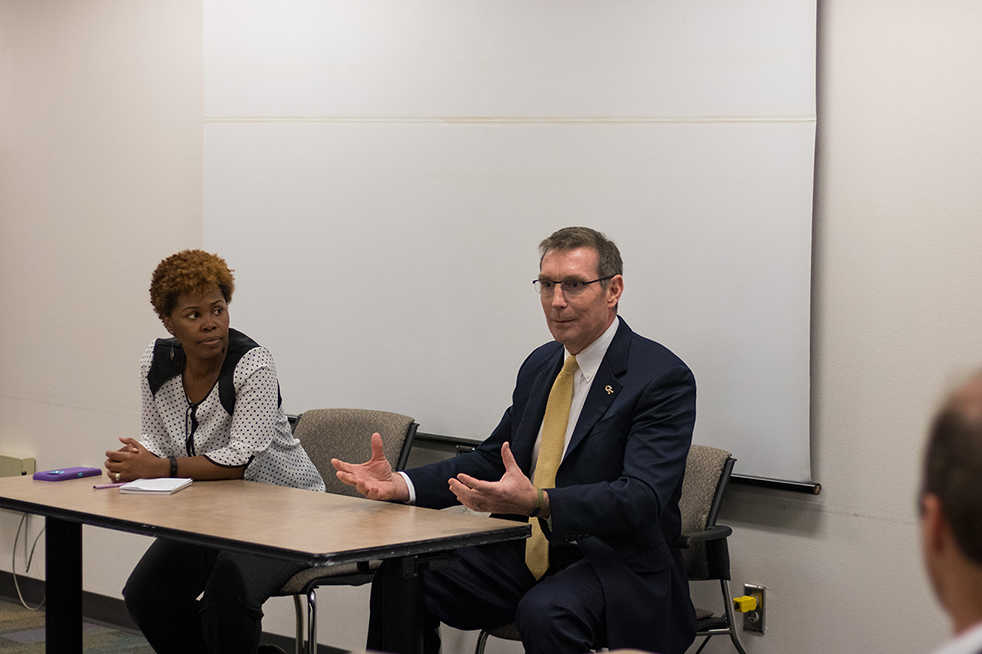During his stint as an athletic director at Oregon State University prior to his current job, Tech Athletics Director Todd Stansbury experienced first-hand the entrepreneurial potential of student-athletes.
“When I was at Oregon State, I had these two student athletes that, organically, we helped them to incubate two companies with athletics,” Stansbury said.
One student, who was interested in film, made a documentary about the Oregon State athletes as they went on a service trip to Guatemala. The footage produced drew up enough attention to land him funding from investors to begin a production company, which now interfaces with Nike.
The other student was developing a product to help social media — back in 2009, when programs were still struggling to understand and leverage Facebook and other nascent platforms.
“I was willing to give him a test kitchen to play around,” Stansbury said.
The student was able to develop a successful company around his product that was eventually bought by Learfield Sports, a firm specializing in marketing solution for schools.
“If you can find out what a student is passionate about, then you never have to worry about them again,” Stansbury said.
Stansbury gave this personal story and several other bits of advice during a Create-X Deep Startup information session discussing sports innovation. The session, which was held on Thursday, Jan. 25, allowed attendees to ask questions and learn first hand the challenges of running an athletic program at a large public university and of opportunities to solve problems within the larger sports landscape.
Stansbury offered his personal thoughts on which sectors will offer the most room for newcomers to enter and innovate.
“As far as the what?” Stansbury said. “It’s so big. It’s so big because there’s performance, there’s wearables, there’s analytics, there’s a better way to train, there’s the next Gatorade, there’s fan experience and how do we make a better fan experience? How do we sell more tickets?”
Unlike schools like Clemson or Alabama, which can rely on steady droves of ticket sales from its dedicated fans, Tech has to be smarter about how it targets its diverse audience within Atlanta, Stansbury stressed.
“Our challenges here are, we’re in a big city. There’s a lot of noise,” Stansbury said, answering a question on Tech’s challenges in connecting with fans. “Our focus historically may have been a little narrow, directly pointed at the Georgia Tech alum, and our market has to be broader than that. And we can’t try and sell every ticket in that stadium exactly the same way. And that’s where the analytics piece comes in. You know, we’ve got to be much more targeted and we need to divide up that stadium.”
The analytics needed to assess a large sports program requires a stream of data tracking all aspects of its operation, from recruiting to player performance, and from sales to fan experience.
“I just hired a new person to run our external operations,” Stansbury said in response to a question on ticket and concession sale analysis. “He’s in the process of inventorying and analyzing everything that we do, and that is concessions, lines, how long it takes, whether we go to clear bag … Everything that we do is being analyzed.”
Because it is tough to fit fans into Bobby Dodd, the oldest on-campus football stadium in the country, when large, feature-filled stadiums such as Philips Arena and the Mercedes-Benz Arena are nearby, Stansbury said that the athletic department is looking at “every closet in the [Bobby Dodd] stadium” to figure out whether it can be converted into amenities.
The other piece that Athletics would like to leverage: the talents of members of the Tech community, which gives GT Athletics an edge over other programs.
“[Other schools] don’t have what we have,” Stansbury said. “They don’t have access to the Institute.”
If a student is interested and has the data analytics skills, they can contact the athletic department for opportunities to process its data.
“Now that we have a masters [degree] in analytics, we’re making connections with students in those areas that we will give them access to real live problems that we need help with,” Stansbury said. “So there are opportunities throughout the department where we could definitely use the help and will give students access to information that they would then be able to try and find solutions to.”
In order to help involve more students in sports innovation, Athletics is planning to hold a sports-centric hackathon.
“I am in talks with two pro teams … trying to identify what are the biggest challenges they have,” said Doug Allman, assistant athletics director for innovation.
“Once we figure that out, we’re going to come together, and basically have a 25-hour straight hackathon, and the pro teams will be there, we’ll have corporate sponsors there,” Allman said. “Are you really going to come up with a solution in 24 hours? Probably not. But you’ll probably have some good ideas.”
In order to be given the chance to fully flesh out their idea, the winner of the sport hackathon will be offered a guaranteed spot in the Create-X Startup program.
